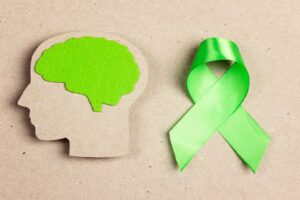The Nystrom & Associates provider consulted for this article is Nic Brave, MS, LPCC, Clinic Director, Outpatient Therapist.
It’s no secret that whether you’re a man or a woman, your mental health is important. While mental illness impacts both sexes – men are less likely to seek treatment than women. Talking openly about men’s mental health spreads awareness and creates a much-needed dialogue so those who are struggling can feel empowered to get the help they need.
Keep reading to learn about the stigma, warning signs, and common mental health conditions for men’s mental health.
Related: Mental Health Awareness
Men’s Mental Health Stigma
Why exactly are men more hesitant to reach out for help?
Part of the problem is due to social norms that create stigma. There is a lot of shame and guilt surrounding men asking for help. Mental illness can be difficult to face, especially if it is seen as a weakness. In addition, men are also more likely to downplay their symptoms and brush them off as a personal issue. As a result, men can turn to destructive coping strategies such as increased substance use.
Remember, expressing mental health problems is not a weakness. Mental illness is the result of chemical changes in the brain. It is no different from any other physical condition and it’s fundamental to receive treatment as early as possible.
Nic Brave, Clinic Director and Outpatient Therapist at Nystrom & Associates, speaks to men who might be struggling with this stigma.
Although we as men sometimes attempt to limit how we express unpleasant emotions like sadness, anxiety, and/or fear, you’re going to experience these emotions nonetheless. It’s important that we demonstrate and validate these feelings. Be honest with yourself. If you don’t, these feelings can arise in the form of physical stress, anger, or encourage us to try and use alcohol or drugs to manage them.
Related: How to Build & Maintain Healthy Coping Skills
The Warning Signs
There are many overlapping symptoms of mental illness amongst men and women. However, there are some signs that are more prevalent in men. Keep in mind that symptoms will differ for everyone. Some may only experience a few symptoms and others may experience many.
In general, here are some of the warning signs to keep an eye on when it comes to men’s mental health:
- Withdrawing from family and friends
- Reliance or increased use of alcohol and/or drugs
- Suicidal thoughts
- Disconnected from activities or things that once brought them joy
- An overall feeling of sadness or hopelessness
- Changes in sleeping patterns; too much or too little sleep
- Participating in high-risk activities
- Inability to concentrate
- Weight changes
- Changes in mood, appetite, or energy levels
- Difficulty meeting family or work responsibilities
By themselves, these signs are not enough to determine a mental health condition. It’s crucial to schedule an evaluation if you or someone in your life is experiencing the signs above.
Common Mental Health Conditions
Below is a list of some of the most widespread mental health conditions among men.
- Depression: While depression affects many men, it’s more often associated with women. Part of this is because men may not express their feelings openly, making it harder to distinguish.
Related: How Therapy Helps With Depression
- Substance abuse: Overall, men have higher rates of dependence on substances like drugs and alcohol than women.
Related: 5 Ways to Prevent Substance Abuse
- Post Traumatic Stress Disorder (PTSD): PTSD is a type of anxiety disorder that is common among men that have experienced combat or other traumatic events. PTSD can include panic attacks, nightmares, and emotional detachment. It is common for men to experience anger and develop substance abuse habits because of PTSD.
Related: PTSD & EMDR Therapy
A Word From Nystrom & Associates
The first step in getting help is awareness. Share this article to help our mission of making mental health a part of everyday conversations.
The qualified counselors and therapists at Nystrom & Associates have been providing help, hope, and healing for over 30 years. If you or someone you love needs help, don’t hesitate to request an appointment or call 1-844-NYSTROM.
Source: Nystrom & Associates











